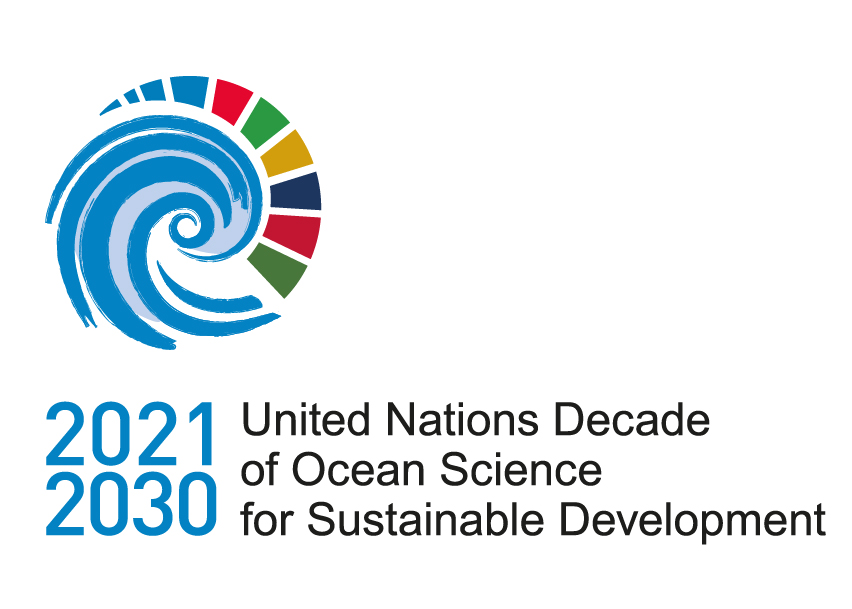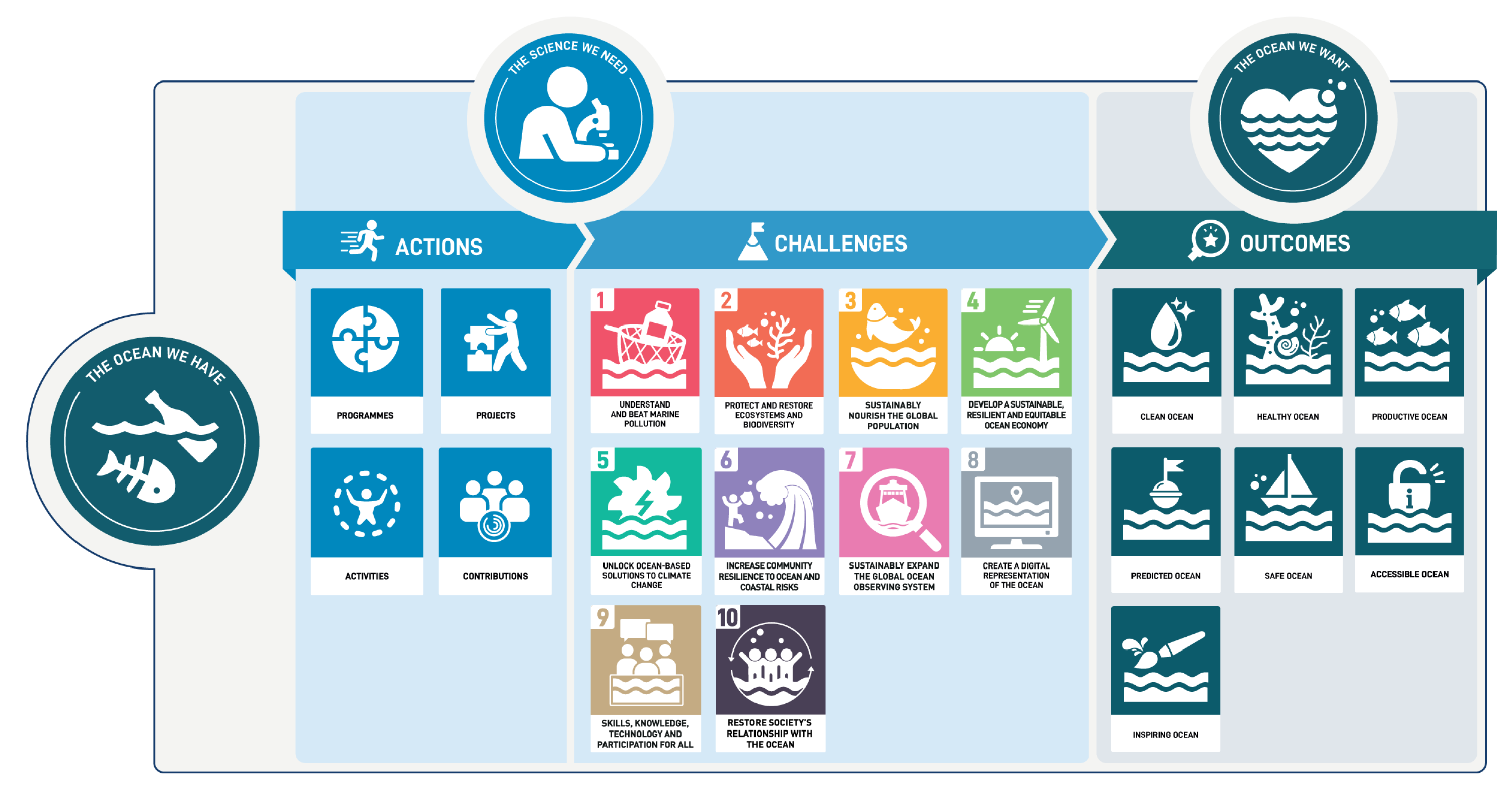 The UN Decade of Ocean Science for Sustainable Development was first announced in 2017 by the UN General Assembly. The ten-year period (2021-2030) is known as the UN Decade of Ocean Science for Sustainable Development, commonly referred to as “the Ocean Decade”. The theme for the decade, ‘the science we need for the Ocean we want’, serves as the guiding vision for achieving sustainable development. Since its launch in 2021, the Ocean Decade has evolved into a global ocean science initiative coordinated by IOC/UNESCO. Its goal is to involve everyone by promoting interdisciplinary ocean research across all levels, using information and knowledge to inform policies and decisions that support a well-functioning ocean in alignment with all SDGs of the 2030 Agenda. One key focus area is resource mobilisation and technological innovation aimed at enhancing capacity, developing scientific knowledge, establishing and sharing infrastructure, and fostering partnerships for a sustainable and healthy ocean. This will help drive the shift from the current state of the ocean to the ocean we aspire to have—one that is healthy, sustainable, and benefits everyone.
The UN Decade of Ocean Science for Sustainable Development was first announced in 2017 by the UN General Assembly. The ten-year period (2021-2030) is known as the UN Decade of Ocean Science for Sustainable Development, commonly referred to as “the Ocean Decade”. The theme for the decade, ‘the science we need for the Ocean we want’, serves as the guiding vision for achieving sustainable development. Since its launch in 2021, the Ocean Decade has evolved into a global ocean science initiative coordinated by IOC/UNESCO. Its goal is to involve everyone by promoting interdisciplinary ocean research across all levels, using information and knowledge to inform policies and decisions that support a well-functioning ocean in alignment with all SDGs of the 2030 Agenda. One key focus area is resource mobilisation and technological innovation aimed at enhancing capacity, developing scientific knowledge, establishing and sharing infrastructure, and fostering partnerships for a sustainable and healthy ocean. This will help drive the shift from the current state of the ocean to the ocean we aspire to have—one that is healthy, sustainable, and benefits everyone.
The Ocean Decade Objectives
The objectives designed to guide global efforts toward achieving "the ocean we want" by 2030:
Identify required knowledge for sustainable development and increase the capacity of ocean science to deliver needed ocean data and information.
Build capacity and generate comprehensive knowledge and understanding of the ocean, including human interactions and interactions with the atmosphere, cryosphere, and the land-sea interface.
Increase the use of ocean knowledge and understanding, and develop the capacity to contribute to sustainable development solutions.
Ocean Decade actions, challenges and outcomes
The Ocean Decade includes ten-decade challenges that envision seven outputs. These challenges portray distinguished framework actions aimed at a global, holistic approach to tackling ocean challenges. Ocean-related issues vary across communities worldwide, with local, national, and regional priorities focussing on the most urgent challenges that align with their specific policies and needs. Challenges addressed can change over time once they are resolved.

The Barcelona statement
The Ocean Decade conference took place in April 2024 in Barcelona, Spain, where several global stakeholders gathered to reflect on the progress and the achievements of the Ocean Decade goals. Since its launch in 2021, the major achievements noted during the Barcelona gathering were:
The generation of over 50 global ocean science programmes that involve everyone across all sectors internationally working together to resolve Ocean Decade Challenges.
Development of over 400 national and regional projects
In-kind contributions of about 100 formal contributions made
More than 4,500 institutions are involved in the Decade Actions, with over 20,000 individuals contributing to their success
Close to USD 1 billion mobilised by the Decade Actions
Future needs and priorities
Conference discussions revolved around the development of a common vision for the future priorities of the Ocean Decade. The identified priorities categories include:
Ocean knowledge and science generation and uptake, including co-designing and co-delivery
Need for ocean science infrastructure, such as pollution monitoring, ocean observations, interoperable ocean data, and innovative technology, among others.
Measures to ensure that the Ocean Decade is on track for success by 2030
The Conference agreed that for the identified priorities for regional and national contexts, specific attention and focus are to be directed towards the needs of SIDS, Least Developed Countries, and other under-represented groups, and opportunity creation for South-South collaboration and exchange. Major commitments were therefore made as the first meaningful achievement of the identified priorities.
Pathway to 2030
The Decade Coordination Unit will be tasked to oversee the implementation of the identified actions for priority areas. It shall do this in partnership with Member States, philanthropic and industry partners, Decade Collaborative Centres (DCCs) / Decade Coordination Offices (DCOs), regional taskforces, National Decade Committees, Decade Actions, and Decade Implementing Partners (DIPs). There are also ongoing discussions among the Co-chairs of the Vision 2030 working groups and other decentralised actors on the best approach for implementation of specific recommendations for each highlighted priority area. Approaches will vary for each Ocean Decade challenge and can span from developing decade programs/initiatives to continuation of the mandate of the working groups in coordinating the implementation of recommendations and their inclusion in the DCCs and DCOs.
